|
Ba-Bk
|
|
|
Born: Stoke Golding 1814, died 17th February 1887 (Leicester Democratic Association)
From its formation in 1858 and for years after, T.P. Bailey served as either president or secretary of the Framework Knitters' Union. He was a leading figure in the trade union and radical movement of the 1860-70s. He saw trade unions as “necessary to working men, as otherwise they would have to submit to great oppression.” He thought that strikes were a great evil, the blame for which often lay at the door of the employer and felt the remedy lay in boards of arbitration. In 1869, he was involved in an attempt to set up a combined union for framework knitters from Leicester, Derby and Nottingham and he played a major role in the successful campaign to end frame charges and rents.
With Daniel Merrick, he was instrumental in establishing the Leicester & Leicestershire Framework Knitters Union, which then provided a basis for the formation of the Trades Council in 1872. In January 1871, he was put on the Liberal slate, with Merrick, as a ‘working man’ candidate for the newly established school board. The newly formed Democratic Association had its first experience of organising the working class vote and Bailey came top of the poll. The Democratic Association was supportive of Leicester’s radical M.P. Peter Taylor.
In 1867, the Leicester Co-operative Hosiers’ Industrial Society was formed and operated from premises in Friday Street where T.P. Bailey lived. The society became known as ‘Mr Bailey’s Society.’ However, it suffered from under investment and in 1873 it was described having departed from its first principles when, instead of manufacturing hosiery, it was buying and selling boots and drapery having taken over a retail shop. It was placed on a new footing when the union bought out the enterprise in 1875.
He was buried in Stoke Golding.
Sources: Midlands Free Press, 25th December 1869, Leicester Chronicle, 24th September 1887
|
|
Born: Hallaton, March 1806, died: Leicester 1891 (Liberal)
Tithes were a tax paid to the Church of England by all. Attempts to transfer the cost of upkeep of the churches from parishioners to church funds, had been rejected by Parliament. From the mid 1830s, there was a sustained campaign by non-conformists against the compulsory payment of rates to the established Church. It was a struggle that lasted 15 years.
Although the opposition was universal amongst non-conformists, only a few were prepared to take direct action. In 1838, William Baines, who ran a draper's shop in the Market Place and was a member of Bond Street Chapel, was one of 21 people in the parish of St Martins (now Leicester Cathedral) who refused to pay the rate on grounds of conscience.
After two years of court action, he was imprisoned in the County Goal, Leicester on 13th November 1840. On the day of the judgement against him, intolerant churchmen rang the St Martin's bells in jubilation. A packed protest meeting at the Theatre Royal passed the following resolution:
In the opinion of this meeting, the levying of Church Rates in England, is a grievous wrong inflicted upon large portion of the community: - that their exaction invades the rights of Conscience and the freedom of religious opinion: - that they lay heavy and unequal burden on those who, at their own expense provide for the maintenance of places of worship, and for that religious instruction which their own sincere and honest convictions approve; - that they are a fruitful source of strife, and discord and ill-will in society, exposing the persons of excellent and virtuous men to cruel, capricious and unlimited persecutions; to boundless vexations and large pecuniary sacrifices; and therefore, for the take of peace and justice, that Church Rates ought to be at once and for ever abolished.
The Town Council passed a motion which called for William Baines' release, the abolition of Church Rates and of Ecclesiastical Courts. Messages of support for him came from all parts of the country and whilst he was in prison, he was nominated and elected unopposed to the Town Council by a meeting of burgesses of the Middle St Margaret's ward. He replaced John Biggs who had just been made an alderman.
At the end of eight months Baines was released from prison, having "purged his contempt." However, he paid neither the £2 5s fine nor the £125 costs. Summonses and distraints continued in Leicester until 1849 and it was not until 1868, that church rates were finally abolished by law.
William Baines remained on the council for Middle Margaret's Ward until 1850, thereafter fighting several elections in the Tory preserve of St. Martins. He was a member of the local branch of the Liberation Society.
Sources: Leicester Chronicle, 16th & 17th January 1891, Leicestershire Mercury, 30th January 1841 A. Temple Patterson, Radical Leicester, A. Balance Leicester Goal [sic], 1841
|
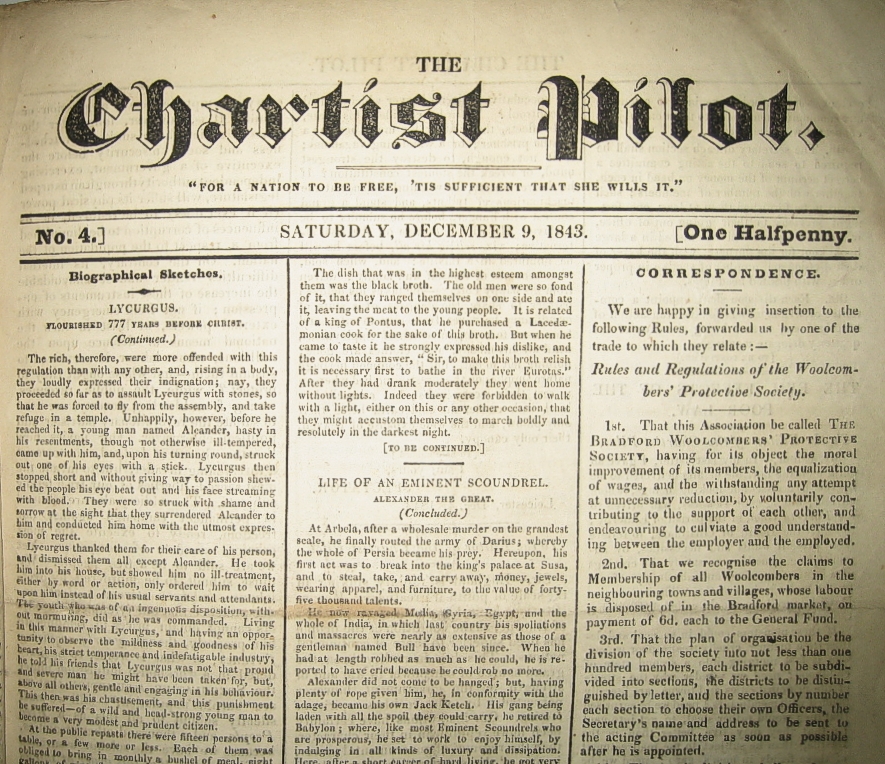 |
Born: 1822? Yorkshire? died: 1853? (Chartist leader)
Jonathan Bairstow was a former weaver from Queensbury near Bradford. He was a highly talented orator who rose rapidly through the Chartist ranks. He was a professional itinerant lecturer originally employed by Chartist associations in the West Riding of Yorkshire. He was tall with a clear strong and musical voice and had a commanding presence at public meetings; his speeches were described as “mostly declamatory and his descriptions extravagant.”
He first visited Leicester in 1840 as a Chartist missionary for a staged debate with the Anti Corn Law League lecturer, John Finnigan. It took place in the newly built Amphitheatre and Bairstow had a rapturous reception. His tendency to favour speaking engagements in Leicester and Loughborough during his employment as West Riding missionary caused resentment.
In 1841, he married Isabella Harris, the daughter of a Loughborough policeman at the old church in Loughborough and Bairstow now based himself in Leicester, although he was also active in Derby. Leicester's location and rail links enabled him to travel widely and make a better living from his lectures.
Bairstow's lectures were often billed as sermons with him 'preaching' intermingling prayers and readings from Watts' Hymn Book with Chartist argument. He timed his sermons to coincide with when the pubs were closed for divine service. This both maximised the audience and competed with the established churches. Bairstow made common cause with Thomas Cooper who used exactly the same approach in the Market Place. It is possible that Cooper borrowed this style from Bairstow, since the latter was the more experienced lecturer. His sermons were duly noted by police informers and passed to the Home Office. This is a short extract of a very long speech delivered in Nottingham in 1842:
Why are we assembled under the broad canopy of heaven? Because as a nation have been insulted, degraded, and trampled on, by aristocracy, who have sacrificed the many to pamper the appetites of the few. Common sense dictates that the happiness of the many should be the ruling point - not of the few. Common sense teaches man that God made governments and constitutions to distribute equal protection and care to all - (Cheers.)
The Holy Book teaches us all, to do unto others as we would they should do unto us; - this is the law and the prophets - this is the law of man and man - as well also in the pages of Revelation are the first grand principles of Chartism borne out - and honoured in the law of reason, nature, and God. We not only demand the Charter on these grounds, but also on the broad grounds of justice, that we should be as equally protected, and as much entitled to political power, as those who claim to be our rulers. (Hear, hear)
In September 1842, he was 'preaching' from the pulpit in a chapel in Bear-lane in Bristol when he was arrested for 'agitating the working classes.' He was subsequently bound over. Along with Fergus O'Connor, he was arrested again in London the following month.
In 1843, Bairstow was arrested and put on trial at the Lancaster assizes along with Thomas Cooper and many others. He defended himself very ably, but along with 30 others was found guilty. However, sentencing was adjourned and due to a fortuitous legal loophole it was never passed. In 1843, he was elected to the National Charter Association and became editor of the Leicester weekly newspaper, The Chartist Pilot, of which 56 editions were produced during 1843-44. The paper was well produced and contained accounts of labour conditions and local comment.
Being a Chartist lecturer was a precarious living and the attraction of decent expenses seem to loom large with him. In 1842, the Loughborough Chartists complained about him claiming expenses and not appearing at meetings, even to greet John Skevington on his release from prison.
At a more personal level, Bairstow's conduct was found wanting. According to George Wray, when William Jones, the Chartist, was sent to Leicester gaol, he entrusted his best clothes to Bairstow. On his release Jones asked for his suit back only to be fobbed off by Bairstow who told him it had been accidentally damaged by water. It turned out that Bairstow had worn the suit threadbare.
Cooper had taken Bairstow into his house and had given him money for travel. Whilst Cooper was in prison, he left Bairstow in charge his business of a bakery, coffee rooms and newsagent. It was reported that he ruined the business, taking three quarters of the money for himself and as a result Cooper’s house had to be 'given up' and Cooper’s wife was taken in by friends. According to Cooper, he also appropriated a large portion of the funds collected to support the Coopers and 'invited card players into the house.'
A good number of Chartists turned their back on Bairstow and set up the Hampden Section of Leicester Chartists, leaving him to lead what was left of Cooper’s Shakespearian Chartists. In 1844, he was seriously injured in a train accident on the Bolton and Preston railway. In early 1846, Bairstow left his wife Isabella and three daughters and disappeared without trace. A year after his departure the Northern Star printed the following:
Mrs Bairstow being in great distress, and not having heard from or of her husband for more than a year, will feel obliged if anyone can inform inform her where he is. Communications to be addressed to her, at Mr A. Quail's, Dead-lane, Loughborough.
There are conflicting accounts of his later life. According to Gammage he left Britain left with the Chartist leader Peter M. McDouall in 1853 for New York, but according to Julian Harney, he was drowned in the shipwreck of The President off the coast of Australia in 1853. According to Lloyd's List The President sailing from Sydney went ashore on Garden Island on August 9th 1853. There is a death of a Jonathan Bairstow registered in Halifax in 1851 and another in Bradford in 1867. Since Mrs Isabella Bairstow remarried in 1853 it is likely that he was considered to be dead.
After Bairstow's departure, one of his supporters described him as having “perpetrated indescribable mischief engendered divisions, misunderstandings, public quarrels and private bad feelings.” In 1846, the Northern Star reported that in Leicester:
Chartism has been pronounced dead at this place. It is not so; principle never dies. It has survived the ruin so ruthlessly began by Cooper, and so pertinaciously carried out by Bairstow. A few half-starved operatives, aided by an old man, nearly worn out in the service, have created a revival of Chartist spirit which will ere long produce great results. The committee meet every Tuesday night, at 36, Sanvey Gate, for the admission of members, and the body every Sunday morning in the pasture.
Sources: Nottingham Review, 20th August 1841, 18th February 1842, Northern Star, 5th December 1840, 17th December 1842, 23rd May 1846, 19th September 1846, 4th September 1847, Leicester Chronicle 24th September 1842, York Herald, 1st October 1842, R.C. Gammage, History of the Chartist Movement, 1894, Thomas Cooper, The Life of Thomas Cooper, 1872, A. Temple Patterson, Radical Leicester, J.F.C. Harrison, Chartism in Leicester, published in Chartist Studies Asa Briggs (ed) 1959, Janette Lisa Martin: Popular political oratory and itinerant lecturing in Yorkshire and the North East in the age of Chartism. Census returns
|
|
Born: Leicester, 3rd December 1904, died January 1999 (Labour Party)
On leaving school in 1918, Albert Baker joined the Leicester City Libraries Department, though later decided upon a career in engineering. Throughout his working life (with the exception of five years in Canada) he worked in the Engineering trade as a textile engineer.
During World War Rwo he was engaged on 'secret government work' and also served in the Home Guard. In 1952, he was first elected to the City Council for the Spinney Hill Ward and served until 1955. He returned to the City Council in 1963 as the representative of Charnwood Ward and then for Wycliffe Ward in 1970. He was a Chairman of the Museums and Libraries Committee of the City Council and a Chairman of the former Civil Defence Committee. Albert Baker became Lord Mayor in 1977 and his son Howard was elected as a councillor in the 1976 local elections.
Sources: Leicester City Council, Roll of Lord Mayors 1928-2000
|
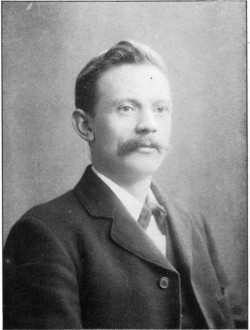 |
Born: Melton 1856, died: April 1932 (Liberal, I.L.P.& Labour Party)
George Banton was described as the man who did the spade work to establish the Labour Party in Leicester. He was bound as an apprentice in the cabinet making trade and joined the Amalgamated Society of Cabinet makers at the age of 19. Soon after finishing his apprenticeship and as a result of the change of ownership of the business where he worked, he left his employment and tramped from Leicester to Birmingham in search of work. He then walked to London where he worked for several months. Being thrown out of work, he tramped back to Birmingham and finding no work, he continued tramping until he reached Liverpool. He then toured most of the chief towns of Lancashire and Yorkshire, occasionally finding work. He made his way back to Leicester by way of Sheffield, Nottingham and Derby. He arrived back in Leicester with only a farthing in his pocket, but within an hour or two he met an old friend who had been seeking him for several months to offer him a job.
After a period of work for the firm Inglesant’s, he went to work for Gent & Co., the electricians. He became a delegate to the Trades Council and, in 1892, was involved in the foundation of the Leicester Co-operative Printing Society and also acted a joint auditor of Equity Shoes for several years. He was eventually elected president of the Trades Council for 1893-95.
At that time, Banton was the Liberal general committee member for Westcotes ward. However, Tom Mann’s speech to the Trades Council in 1894 was so effective that he left the Liberals and joined the I.L.P., becoming the first president of the Leicester Branch, a post he held from 1894-1909. As a result of his support for Socialism, his union removed him as its Trades Council delegate. In November 1896, he became the second I.L.P. member to be elected to the Town Council representing Wyggeston ward. Being a Labour Councillor caused him difficulties with his employer, so he went into business as a coal merchant.
For many years, he was the leader of the Labour Group on the Town Council. He became president of the Labour Representation Committee in 1904, was made an alderman in 1905 and a magistrate in 1907. He was a lay preacher at the Free Christian Church, Harrow Road and was active in forming the first allotment society in Leicester.
He was adopted as the I.L.P. candidate for the 1913 parliamentary bye-election, breaking the electoral pact with the Liberals, but was forced to withdraw by Labour’s national leadership. Backed by the local ILP branch, Banton sent a telegram of support to the British Socialist Party Candidate, E.R. Hartley who hurriedly stood against the Liberals.
On August 2nd 1914, along with the other leaders of the Leicester I.L.P., he spoke out against the pending war:
Whatever might be Austria's reason for war, I ask you: is the Archduke's body worth more than the body of a common soldier? No, yet there will be thousands and thousands of lives lost and seas of human blood spilled as a result of that murder.......
We are here to protest against Britain taking part in the war. As common people we will join with the Social Democrats of Germany and the Socialists of France and cry out against war.
Britain is being asked to help Russia. We are being called upon to take the part of the bloody tyrant, the Czar, against German democracy. Why should we waste lives for the sake of such men?
Throughout the war, Banton advocated MacDonald’s ‘People’s Peace’ and opposed the introduction of conscription. His son Kenneth was a conscientious objector who was arrested in May 1916. In the 1918 'coupon' election, George stood as a parliamentary candidate for Leicester East and was heavily defeated. However, he was elected to parliament for Leicester East in 1922 and again in 1923, but was defeated in the 1924 election. He became Mayor in 1925 and as chairman of the Tramways Committee in 1926, prevented the Corporation from running the trams with volunteers and or blacklegs during the General Strike. At his funeral, his coffin was carried by local tramway workers.
Sources: Leicester Pioneer, 2nd September 1902, 26th June 1913, 7th August 1914, The Labour Party Conference 1911, Official Souvenir, Leicester 1911, Leicester Daily Post, 25th May 1916, W.W. Borrett, 21 Years on the Town Council, 1917, Howes, C. (ed), Leicester: Its Civic, Industrial, Institutional and Social Life, Leicester, 1927, Bill Lancaster, Radicalism Co-operation and Socialism, Leicester Mercury, 19th, 22nd & 29th April 1932, Leicester Evening Mail 19th, 22nd April 1932
|
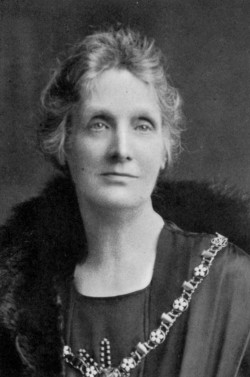 |
Born: Stapleford, Cambridgeshire c1870, (I.L.P.& Labour Party)
Ruth Banton joined the Salvation Army at an early age, rising to the rank of captain at the age of 16. After 7 years in the army, she resigned and came to Leicester and took a position at the Victoria Road Church Mission. She continued her social work until she married George Banton. (his second wife)
She helped form the Women’s Labour League in March 1906. Local founding members included: Marina Peach, Annie Stretton, Mary Hill (aged 17) and Margaret MacDonald. She acted as secretary of the Women’s Labour League for many years, becoming secretary of the Labour Party Women’s Section. She was a committee member of the Newton ward infant consultation centre founded in Marina Peach’s memory.
Ruth Banton was elected to the Board of Guardians in 1913 and served until 1928. She was involved with the beginnings of the Highcross Street Infant Welfare Centre and the promotion of a Municipal Maternity Home. She was described as having
“an indomitable spirit behind a gentle manner and frail physique….she excelled in her Labours in the comparative obscurity of the committee rooms of the Poor Law Institution. Always painstaking and conscientious, never caring for publicity, her one object has been to secure justice for those compelled to seek Poor Law assistance.”
Sources: Leicester Pioneer, 16th May 1924, Howes, op cit
|
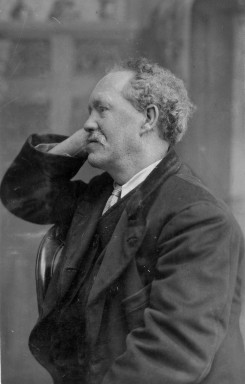 |
Born: 1852, died: 1933 (Socialist League, SDF, Anarchist Communist Group, I.L.P., Secularist)
Although Tom Barclay scraped along in various menial jobs for most of his life, he had a profound influence on the intellectual life of the City. He was born in a two-roomed hovel in an 18 ft. sq. court off Burley’s Lane and was the son of Irish parents who had been starved out of Ireland by the potato famine. His father was from Limerick and his mother from Connaught. Barclay never went to day-school and was taught to read by his mother. In the 1870s, he attended classes at the Working Men’s College under the Rev. D.J. Vaughan, whilst working at Cooper and Corah’s hosiery factory. Iinfluenced by the writings of the American secularist Robert Ingersoll, he eventually rejected Catholicism and joined the Leicester Secular Society in 1881.
He had a deep love of literature, especially Ruskin and felt an obvious empathy with William Morris' socialist ideals. Barclay felt that the moral, intellectual and spiritual degradation caused by capitalism was as much to be despised as the poverty it created. Although previously a member of the S.D.F., in November 1885, he became a founding member of the Leicester branch of the Socialist League and contributed to Morris’ Commonweal. He was an active propagandist for socialism speaking wherever he could find a platform. The Socialist League published his pamphlet The Rights of Labour according to John Ruskin which sold for one penny. Ruskin described it as "the best abstract of all the most important pieces of my teaching that has yet been done."
Tom Barclay, with George Robson, were Socialist League's only propagandists. In 1888, Barclay complained the despite all the discussions in open air and at the clubs, we can get no additional members, and no better organisation. Even our own members, will not come up to meetings indoor or out of door; and Robson and myself have had no support. Barclay said that Leicester is given up to Teetotalism, Religion, and Horse-racing; and Radical as it is considered to be, puts the boycott on Socialism wherever possible without appearing tyrannical.
When William Morris gave a lecture on the Class Struggle for the Socialist League at the Co-op Hall in 1890, Tom Barclay chaired the meeting.
In 1886, Barclay was also briefly general secretary of the Leicester Area Hosiery Union. The same year, he produced a weekly newspaper, the Countryman that was distributed free to over 50 villages and was financed through advertising and the patronage of J.W. Barrs, the secularist tea merchant. The first issue came out in March 1886 and displays Barclay's pen in full flow, with numerous articles tucked between the copious adverts. There were features on village hosiery strikes, political economy, magisterial appointments and an essay competition for agricultural workers. It ceased publication in the early 1890s.
Despite Bradlaugh's rejection of Socialism, he remained one of Barclay's heroes. At the news of Bradlaugh's death, Barclay was found in St Saviours Road crying like a child. During his life he was a member of the S.D.F., the Anarchist-Communist Group and the Independent Labour Party, but he disliked the sectarianism of the left of those days. He upset fellow Anarchists by speaking at I.L.P. meetings and supporting Joseph Burgess for parliament. He claimed to have influenced many of the founders of the I.L.P. including T.F. Richards, George Banton, Jabez Chaplin, Amos Sherriff and his life-long friend Archibald Gorrie.
Probably because of his impoverished background, Barclay held a long-standing aversion to co-operative production. He believed that whilst co-ops enhanced the status and economic position of the better off workers who could contribute funds, they left the deeper problem of poverty untouched.
Barclay set up the weekly socialist newspaper the Leicester Pioneer, probably in 1892. It was aimed exclusively for the Leicester Labour movement and claimed 5,000 readers. Unfortunately, none of the early issues survive. When the paper was later re-established by F.J. Gould with the backing of the Trades Council, the I.L.P. and some Liberals, he played no further part in the paper.
During the 1890s, he worked as a house to house bill distributor and took note of the people’s living conditions. This served as a basis for a series of articles on Leicester’s slums for The Wyvern written under the pseudonym of Armer Teufel (poor devil) He also wrote on a number of other topics including Some Memoirs of a Literary Hot Pea Vendor. He then moved to London where he did a similar job. At this time he became convinced that he could not be true Irishman without learning the language and took classes in Gaelic. He later went to work for 12/- a week on Lord Dunraven's estate near Limerick in order to learn the language. He returned to Leicester in 1902 and set up a short-lived branch of the Gaelic League in the town.
He had no desire for office even within the Secular Society and despite the hard conditions of his life, refused offers of financial help from his friends. It would seem that the austere and teetotal form of secularism favoured by the local organiser, F.J. Gould was not to his taste. He never married having been disappointed in love in his ‘teens. Later in life, when it was clear to him that he would always be poor, he determined never to marry and have children and have them suffer the privations that he had known as a child. He was a vegetarian.
Barclay had a wide circle of friends, his fund of knowledge on books and authors, of humorous tales, of limericks and school boy howlers made him excellent company. Sometimes he would get out his whistle and amuse the children by dancing Irish jigs. Children grew very fond of him. One observer described as being: ‘never so happy, as when he is making economic problems clear to the comprehension of a costermonger in a Leicester court or alley. He is the Socrates of the Market-place and street comer.’
In 1929, at the age of 76, he was still working as bottle-washer at P. Wiggins beer bottlers on Humberstone Gate. This gave him the title of his memoirs which he worked on at his lodgings at 162 Evington Road. In his time he said he had worked in twenty factories over a period of fifty years, having been a shoe hand, bill distributor, advertisement canvasser, osier plucker and peeler (stripping the bark from willow wands for basket making), tramcar cleaner, railway linesman, hotel boots and jam jar cleaner.
Throughout his life Barclay had an insatiable thirst for knowledge. He was a true working class intellectual and freethinker. Aged 81, he died in his sleep on the morning of New Year’s Day 1933. He left behind a memoir on his life which was written in the pages of a Workers’ Union ledger always on the right-hand page so that when he reached the last leaf he turned his ledger upside down filled up to the first page and then he added flyleaves. The diary was not kept with any great sense of good order but James Kelly edited it and his book: Memoir and Medleys: The Autobiography of a Bottle Washer was published in 1934 by Edgar Backus.
Sources: Justice, 23rd July 1887, Leicester Chronicle 15th March 1890, The Commonweal 4th August 1888, The Wyvern, 25th January & 7th June1895, Derby Daily Telegraph 31st August 1895. Leicester Evening Mail, 22nd February 1929, Leicester Mercury 16th February 1934, Tom Barclay, Memoir and Medleys: The Autobiography of a Bottle Washer 1934, Bill Lancaster, Radicalism Co-operation and Socialism, Leicester Working Class Politics 1860-1906, Nash, David, Secularism, Art and Freedom, Leicester 1992,
|
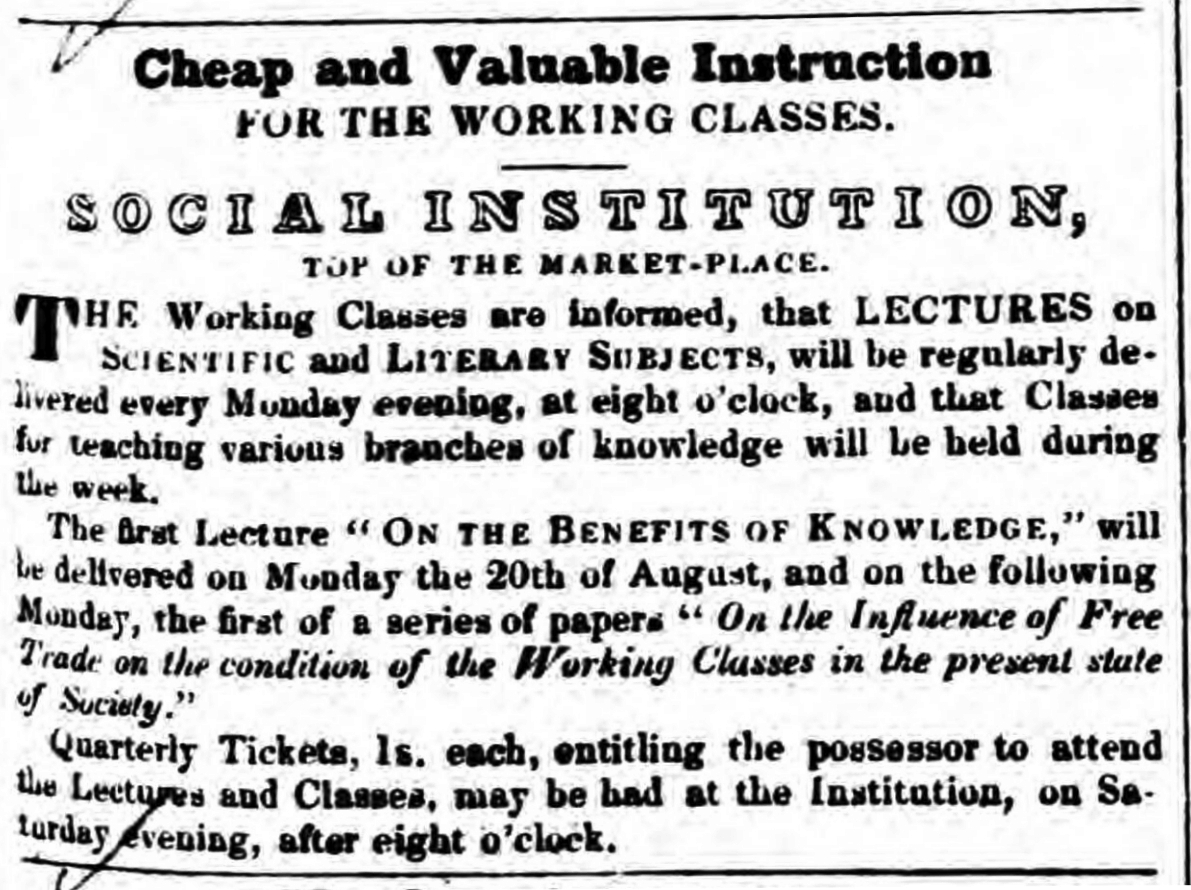
Leicester Chronicle 1838
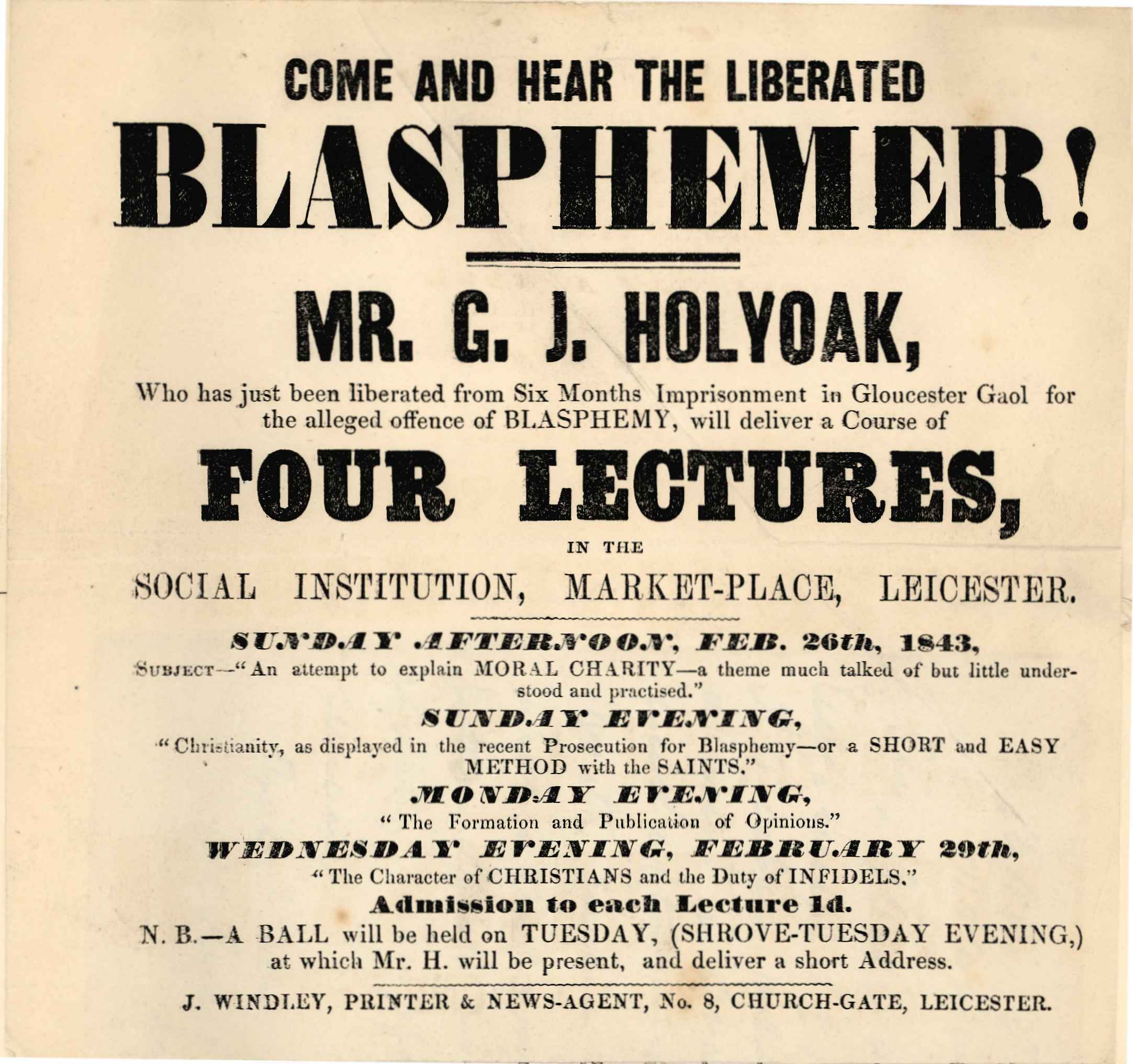
1843 Handbill
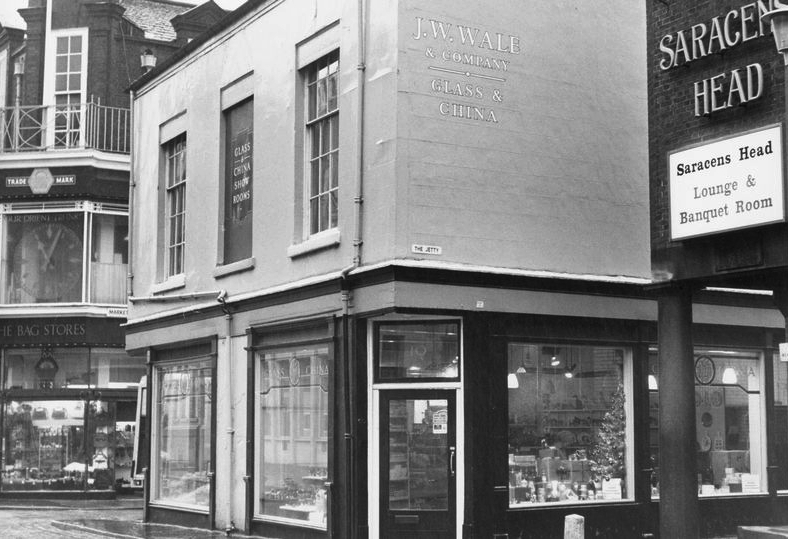
The premises in 1975 (Leicester Mercury)
|
J. Barlow and Barlow's Rooms
Born: ?Died: ?
The new Commercial Sale-Rooms in the Market Place opened in c.April 1830 with a lecture on astronomy and optics and William Cobbett spoke there on the state of the country in the same month. (The Leicester Herald wanted him arrested for blasphemy & sedition). The premises soon became know as Barlow's Rooms and in the early 1830s it became a well used venue for lectures, sales and meetings. The rooms were at 1 Market-place and Hotel street and the meeting room was upstairs, situated over several shops and vaulted cellars below. As a meeting place it was not as grand as the nearby County Assembly Rooms and or the larger New Hall in Wellington Street, (the former Central Library), or the huge amphitheatre on Humberstone Gate however Barlow's Rooms were well used. The rooms were built and owned by Robert Barlow of Town Hall Lane who was an elected Freemans' Deputy and was active in trying to prevent the misuse of the Freeman's income from Freeman's' Common. In the late 1830s he went to the USA and returning in 1841, but returned to the USA and died in Virginia aged 58 in 1853.
The rooms were used for the first public lecture of Owenite Socialism in July 1838 by E. Nash. The premises were then rented by the local Owenites and was opened as the Social Institution later that month. In other towns, the Owenites built Halls of Science, but in Leicester they were able to rent a very suitable building in a central location. According to the New Moral World
Leicester must henceforth be looked upon as a stronghold of Socialism. The branch have secured the best room in the town, except one, for size and situation; it numbers among its members many of the most intelligent, moral, and industrious young men to be found within its bounds—men of scientific acquirements and highly cultivated minds, and who have entered into the work with all the enthusiasm and determination which the social views can alone engender in such minds. The singing, with orchestral accompaniments, was admirably managed on Sunday, and the tea party, composed of a numerous and respectable assemblage, seemed, from its novelty and kindly effect upon their sympathies, to be highly delightful to all present.
The precise relationship between J. Barlow, a local supporter of Robert Owen and Barlow's Rooms has not been established; it is possible that it is John Barlow, the coal merchant brother of Robert, however he did not have anything to do with the management of the rooms after his brother went to the USA. In 1838, J. Barlow wrote an account of a meeting at the Social Institution for the New Moral World and is mentioned as an activist in Gould's History of the Secular Society. This account was given in 1838:
we held a social festival on Thursday, which was attended by about one hundred individuals. After the company had taken tea and coffee, dancing commenced, which, with singing and recitations, occupied the attention of the company till eleven o'clock, when they separated, highly gratified with the harmonious proceedings of the evening; forming, as they did, so striking a contrast to the scenes of riot and dissipation which prevailed in the town.
This rabid account of the goings on in Barlow's Rooms comes from the Leicester Journal.
Socialism
lt is with feelings regret, that we are compelled to witness an existing nuisance almost every evening at the upper-end of the Market-place by a number of warehouse boys and girls, who call themselves "Socialists," assembling at their conventicle, formerly called "Barlow's Rooms," for the purpose of delivering, what they term "lectures." We allude more particularly to the Sunday evening, when these poor deluded young creatures congregate, to lecture, or rather to read portions from a book written by that misguided man and wild enthusiast, Owen, of Lanark. It is a system, infidel and evil in character, and while it proceeds upon the basis of promoting the temporal welfare of its victims, hurries them into the depths of infidelity, onward to spiritual misery and destruction; one of their leading principles is to abolish all marriage, men and women living together in communities, when on being tired of each other, they are to get other partners! These Owenites meet in all the mockery of place worship, where they also read what they call 'a Social Bible,' parodying the Holy Scriptures. From that book are read portions containing maxims of social economy, and inculcating doctrines subversive of all settled institutions, either political or religious and ridiculing the revealed truth of God. They have also a 'Social Hymn Book,' from which they sing parodies of the most admired and spiritual hymns used among Christians. The Sabbath is thus shamefully profaned, and surely, this disgusting affair calls loudly for the interference of the legal authorities, or the Inspector of Nuisances.
Despite the urgings of the Bishop of Exeter, the Vicar of St Margaret's and the Leicester Journal. In the House of Lords, the Mayor of Leicester was reported as saying that although the 'socialists' held frequent meetings, attended by many out of curiosity, the superintendent of police had attended many meetings and had reported to the magistrates that everything had been conducted in most peaceable manner. The Stamford Mercury gives this account of a meeting at the Social Institution in 1840:
On his entering the room, pianoforte was being played, which continued until the service commenced: this was singing a socialist hymn by a very good choir of singers.
A lecture and further hymns usually followed. In 1841 it was reported that three lectures a week were being given:—Sunday evening, on “Socialism;” Monday, on “Science;” and Wednesday, current affairs,. however by 1843 it reported that the classes at the Institution were now its principal feature, consisting of a senior and a junior dancing class, a class for the study of natural philosophy, and a singing class for the practice of Hullah's system of singing, as well as a choir. and amusement parties. Sunday lectures were thinly attended. The last recorded lecture was on Sunday February 16th 1845, when the veteran radical Thomas Ryland Perry, who had been imprisoned for blasphemy in 1824, spoke on Christianity.
By the summer of 1845, the Owenite Community at Queenwood bankrupted the Rational Society and the whole Owenite movement imploded. The Leicester Journal crowed that: It is evident that there is about to be an explosion in the "Rational Society," that the "new moral world" is, like the old "irrational world," subject to debt, division and decay, and other ills which "flesh is heir to." We guess there will be a pretty display "rationalism" when the state of the finances produced. By 1848, Barlow's Rooms were up for auction, but the Rational Society was not named as a tenant. The building was listed in 1975 and though today the big upstairs room still exists, it contains all the air conditioning units for Market Tavern and does not make pretty viewing.
Sources: Leicester Journal, 2nd April 1830, 20th April 1832, 28th September 1838, 21st June 1846, New Moral World 21st July, 4th August, 22nd September 1838, 16th January 1841, 18th February 1843, Leicester Chronicle 10th October 1829, 24th April 1830, Leicester Herald 5th May 1830, 17 November 1838, Leicester Mercury 5th April 1845, The Movement 12th February 1845, Stamford Mercury 21st February 1840, F. J. Gould, The History of the Leicester Secular Society, 1900
|
 |
Born Leicester c1852, died:1922 (tea merchant & Secularist)
Barrs was a well-to-do tea secularist merchant and a well-known radical with idiosyncratic tastes in both arts and politics. According to Tom Barclay it: 'Twas a habit of him to purchase and read any book that the popular and ordinary critic condemned.' He was very keen the the Secular Hall should be a picture gallery open to the public during the week and also on Sunday evenings.
His father John (c1825-1874), had been a prominent conservative councillor He was member of the board of Guardians, church warden at St Martin's church and member of the school board. Barrs senior ran a grocers shop on High Street, it had been specialising in tea since the 1850s. The was another Barrs grocers on the corner of Belgrave gate and the slums of Garden Street.
In the 1881 census, John Barrs described himself as a tea dealer and local atheistic lecturer (occasional). Later, that year he spoke at a public meeting in support of Women's Suffrage. He was also an early advocate of the nationalisation of the land.
Barrs met Barclay through the Secular Club and wanted a publish a journal which could express the unconventional without let or hindrance. In 1886, Barrs financed a free paper, The Countryman, which relied on advertising for its revenue. He gave Barclay complete editorial control. Barrs was a friend of the poet James Thomson, (1834-1882) who contributed to Bradlaugh’s National Reformer and wrote a poem for the opening of the Secular Hall. Barrs’ tea was well advertised in the Leicester Pioneer. In 1890, he chaired a meeting of the Socialist League entitled the "Evoluted Cannibal" and given by Mr Halliday Sparling.
Sources: Leicester Chronicle, 24th December 1881 3rd March 1883, 8th February 1890, David Nash, Secularism, Art and Freedom, census returns, Bill Lancaster, Radicalism Co-operation and Socialism.
|
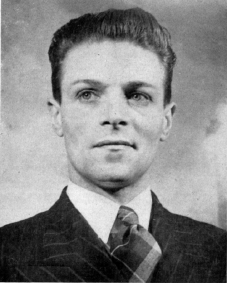 |
Died: May 1974 aged 55 (Labour Party)
Sam Barston was educated at Green Lane Boys School and later at Moat road Intermediate School leaving at the age of 14. He was an ardent trade unionist from his youth, becoming a shop steward at J.P. Engineering in his teens. During the war his occupation was reserved and he served in the home guard. In 1953 he was appointed as district secretary of the A.E.U. and was also elected to the City Council for Charnwood ward. He held the seat until 1968. In 1956, he won an American Government scholarship that took him to the United States for four months. In 1973, despite a strong challenge from a left-wing candidate, he won a fifth term of office as AUEW district secretary in a postal ballot. Not long after, he had a nervous breakdown and in May 1975, whilst severely depressed, he hung himself.
Sources: Leicester Mercury , 21st May 1974 & 16th March 1976, election addresses-Leicester Labour Archive
|
|
The Leicester Daily Mercury reported in October 1921 that there was ‘an unfounded rumour going about the town on Saturday night, that the negro taken to the Royal Infirmary, after the affray at the Clock Tower was dead.’ The same day the Leicester Mail reported that 'Darky' Barton was ‘comfortable.’ Rumours are notoriously difficult to quash. Even after 50 years had passed, the author was told that the police had killed a black man following their crackdown on the demonstration of the unemployed. (see Dennis Jennett) R.V. Walton remembered 'Darky' Barton as one of a group of people that used to hang about the Clock Tower. In an all white city his dark skin must have given him a considerable amount of notoriety. Since he was only ever referred to as ’Darky’ it is difficult to trace death certificates, however the author has found no records of any Barton dying in Leicester in 1921.
Sources: Leicester Daily Mercury & Leicester Evening Mail, October 3rd 1921.
|
|
Born: Leicester Stoughton c1855, died: Sept 11th 1922 (Co-operator)
George Bastard was involved with the Temperance movement and was much influenced by the Christian Socialists. His first connection with the Co-operative movement came in the 1876, when he became an auditor of the Leicester Co-operative Hosiery Society. He was elected to the Board of the Co-operative Society in 1885 and remained a board member for at least 26 years. He declined to be nominated for president of the Co-op in favour of Amos Mann. He was the Co-operative Society’s librarian and worked as a relieving officer for the Board of Guardians.
Sources: Leicester Co-operative Society, (1898) Co-operation in Leicester, Leicester Co-operative Monthly Record, November 1885
|
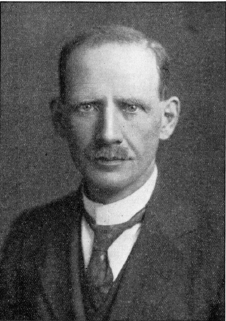 |
Born: c1878, Mountsorrel (I.L.P.)
Edwin Baum’s father Henry was an illiterate stockinger who realised the value of education and tried to obtain the best education for his son. His early education was at St Peter’s School, Mountsorrel and it became his duty to read the newspaper to his father. Family circumstances did not allow him to go to grammar school. When he was 14 his family moved to Leicester and he started as a ‘sweeping lad’ in the hosiery trade, before graduating to a Cotton’s patent frame. He joined the I.L.P. at its foundation, even before there was a local branch. He was elected to the executive of the Hosiery Union in 1914 and during the war he was President of the Union for 2½ years. He became President of the Trades Council in 1921 and was also a member of the LCS board. He was a total abstainer.
Sources:
|
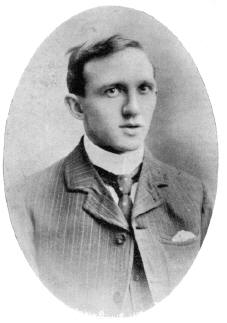 |
Born: 18th Dec 1878, Dalbeattie, Scotland died: 1935 (I.L.P)
Jimmie Baum was the son of a quarry worker. After his father was killed in an accident, he was brought up in Mountsorrel by his grandfather (Edwin Baum’s father), who had been a staunch Chartist. His early education was at St Peter’s School, Mountsorrel. He worked all his life as a clicker in the boot and shoe trade.
He was always a studious individual and as a youth attended the Working Men’s College and later became a member of the University Tutorial classes studying economics and biology. He was active as a lecturer in the adult school movement and was a founder of the WEA.
He joined NUBSO No 2 Branch in 1896. He was elected Secretary of the Trades in 1912 and held the position for 11 years. He eventually became the National Organiser of NUBSO. He joined the I.L.P. in 1900 and after the war acted as agent in West Leicester for Labour MPs Alf Hill and Fredrick Pethick-Lawrence.
Sources: Leicester Pioneer, 25th April 1924, Trades Council Year Books, Alan Fox, A History of the National Union of Boot and Shoe Workers, 1958
|
|
Born: St George, Middlesex, c1834 died: 1917
Anna Beale came to Leicester in 1876 as the headmistress of the Belmont House School on New Walk. She remained headmistress until 1882 and then continued to teach French and German at the school until 1887. She resigned her post due to ill health. Whilst at the school, she enabled girls to take the London Matriculation for the first time. In 1887, she became the first joint secretary of the Leicester and Leicestershire Women’s Suffrage Association.
Sources: Isabel Ellis, Records Of Nineteenth Century Leicester
|
|
Born: Loughborough,c1852 died:1928
Israel Beck's radical light shone very brightly for a couple of years and was then extinguished. He was a shoe riveter, Sunday School teacher and initially a member of the Social Democratic Federation. The S.D.F. was established by Henry Hyndman as Britain's first organised socialist political party and in 1892 Beck became the S.D.F.'s 'Independent Labour' Candidate for Spinney Hill. Despite all his campaigning, he was forced to withdraw his candidacy as a result of being threatened with legal action by Liberals over a minor breach of electoral law. He denied the suggestion from the Liberals that the S.D.F. candidates were being backed by the Tories as a way of splitting the Liberal vote.
In 1894, Beck and T.F. Richards, also a former S.D.F. member, became a founder members of the local I.L.P. branch. In April 1895, Beck, became the second I.L.P. member to be elected to the Town Council where he joined T. F. Richards who had been elected a months earlier. The 1895 election in Castle Ward was held at the height of the employers' lock out and his victory, in a three way contest, may have reflected public sympathy for the trade union's position.
Beck was a member of the Trades Council and was very active within the Boot and Shoe Union. In 1895, he unsuccessfully ran for president of NUBSO against the Liberal trade unionist Richard Cort. That year, Beck assisted in the formation of the 'Leicester "Self-Help" Boot and Shoe Manufacturing Society Limited, founded as a result of the lock-out in the boot and shoe trade. A factory was opened at the back of a hotel in Willow Street, Leicester with a small amount of capital put forward by Mr. Harry Page, Mr. Israel Beck and others. In 1905, he was president of the Society when a new factory was opened in Dartford Road, Aylestone.
Beck's sojourn on the council was short-lived as he was defeated in a straight fight with the Tories later in 1895, losing by 33 votes. A few weeks after his defeat, he was present at a meeting of the National Conservative League and continued in that party for some years after. He seems to have dropped out of any prominent union activity.
Beck's sudden defection to the Tories may have been connected to Thomas Watson Wright, a former Melton County Councillor and prominent solicitor. He had joined the S.D.F and stood in Aylestone in 1892 for the Council. He was described as the "joke of the election." Wright then deserted the S.D.F. and was elected for Aylestone as a Tory in 1895. During 1890s, the National Conservative League set up local lodges to attract working class voters and Watson Wright was active in these as well as in the Primrose League. Watson Wright's behaviour seems to give the Liberal claims about the S.D.F. being used by the Tories some plausibility, though it does not adequately explain Beck's sudden volte face.
Sources: Leicester Daily Post, 14th October 1892, 16th September 1895 20th September 1905, Leicester Chronicle, 29th October 1892, 8th December 1894, Leicester Journal 29th Novemebr1895 27th March 1896, James Moore, The Transformation of Urban Liberalism: Party Politics and Urban Governance
|
|
Born: Richmond, Victoria, Australia 1872, died 21st November 1957 (I.L.P.)
Seaward Beddow went to school in Australia and to university in Toronto, Canada. Whilst in Canada he married Ethel Cooper. From 1911, he was the pastor at Wycliffe Congregational Church. (Previously he had been assistant to Dr Ambrose Shepherd in Glasgow and then at Carey Hall) He was active in the I.L.P. and also chaired public meetings of the British Socialist Party. In 1911, the Leicester Cricket Club became the first ever English cricket club to visit Germany. The tour was led by Seaward Beddow who told of his hope that cricket might improve the character of the Germans as it had previously done for the English. Speaking of the 1911 railway strikes he said that he had:
no hesitation in saying that the recent strikes were right. They were not brought on by the selfishness of working men, nor the unusually hot weather. They were earnest demand for a larger life. They were blow aimed at conditions which insult human beings.
During World War One, Beddow was active in the pacifist Fellowship of Reconciliation and in the inter war period he became president of the Leicester Christian Pacifist Fellowship.
Seaward Beddow wanted to see Christianity applied to every day affairs - he believed that the Christian Churches should understand the workers' problem from the standpoint of the workers. They must show their sympathy for the men in their struggle for opportunity for themselves and their families. They must deal publicly with the deep moral wrongs that lay at the base of the social problem.
In 1920, the Bloomsbury Press published his play: The Challenge with a foreword by George Lansbury. The play tells a tale of 'Christian-socialist endeavour under stress of politico-religious persecution.' The Minister of a Congregational Church, which is financially supported by capitalists, preaches a militant pro-strike sermon, and finds himself between the devil of compromise and the deep sea of unemployment. He wrote two more plays: The Pro-consul (1925) and The Prodigal Son (1933) which had largely religious themes. He was a well-known producer of amateur theatricals as well as being a talented actor. In 1933, the Wycliffe Players, based at his church, staged the science fiction play R.U.R. written by the Czech Karel Capek about a revolt of robots. Sometimes his dramatic presentations substituted for church services and the Wycliffe Players continued after the war.
Seaward Beddow was active in the ‘No More War’ movement in the 1920s and 30s and was a lecturer for the Workers’ Educational Association. In 1928, the Wycliffe Congregational Church refused to observe the two minute silence on Armistice Day. This was a protest at the way Armistice Day services had come to be dominated by militarism. During the two minutes children sang the hymn 'Our Blest Redeemer,' which Beddow believed would direct their thoughts to Jesus, 'the greatest internationalist that ever lived.'
In 1934, he was a signatory to a local anti-fascist manifesto which stated:
"Under the sadistic rule of Fascism, the conditions of the toiling people have been worsened to an appalling degree, and honoured leaders have been degraded, insulted and imprisoned. Fascist policy has tremendously heightened the danger of war. Fascism, which glorifies war and violence, constitutes the gravest menace to peace. It is vitally necessary for progressive elements to unite, not only in protest against Fascism abroad, but also against its efforts to take root here in England."
Other signatories were: E. H. Hassell (vice-president Leicester Secular Society). W. R. Burwell (president Leicester No More War Movement). E. A. Peacock (president, Leicester and District Trades Council). Amos Mann (chairman. Leicester (Co-operative Society). J J. Worley (secretary. Co-operative Productive Federation), J. E. Potter (Leicester Co-operative Society Board). W. J. Owen (Leicester Co-operative Education Committee), H Perkins (president. Leicester No. 2 branch Boot and Shoe Union). Alfred William Barrows (Midlands Organiser N.U.D.A.W., J. Belfield (chairman, Leicester Solidarity Committee). N. H. Smith (secretary Leicester Youth Council against Fascism and War).
Together with Canon Linwood Wright, Seaward Beddow helped raise money for supplies for the 1934 Hunger Marchers in 1934 when they passed through Leicester. This was at a time when the official trade union movement was hostile to the NUWM led protests. Canon Linwood Wright recalled that Mr. Beddow and I got together and "We felt we should give them something to stimulate them and uplift them and decided on corned beef and pickled onions. The pickled onions were a real stimulant. They picked up their spirits and we reckon we saved England from revolution with corned beef and pickled onions."
In 1935, the Wycliffe Congregational Church congregation carried a motion condemning the cruel application of the Means test.
In 1936, Seaward Beddow helped set up the Leicester Peace Council and in 1938, he described Air Raid Precautions as “a hindrance to peace and a direct encouragement to war.” However, Beddow's views were at odds with those being put forward at the Left Book Club by J.B.S. Haldane who criticised the Govt's A.R.P. scheme as being inadequate to protect civilians and urged the building of deep shelters.
A month later, on behalf of the Leicester Fellowship of Reconciliation and the Peace Pledge Union, Seaward Beddow congratulated Neville Chamberlain on his infamous Munich Agreement: "We are much encouraged by the assurance you have brought back with you."
His wife, Ethel Seaward Beddow, (born c 1879) was elected to the Board of Guardians in 1913-1916 for the Labour Party. She had been a trained nurse with four years of hospital and private nursing experience.
Sources: Leicester Chronicle, 30th September 1911, Leicester Daily Post, 7th April 1913, The Daily Herald, 2nd February 1921, 5th February 1935, The Stage, 15th January 1925, Hartlepool Northern Daily Mail, 8th November 1928, Leicester Evening Mail, 9th February 19th October 1934, Leicester Mercury, 10th February, 9th December 1936, 22nd & 28th September, 1st October 1938. Dan Waddel: Field of Shadows: The English Cricket Tour of Nazi Germany 1937
|
|
Born: 17th July, 1856, Hinckley (I.L.P.& Labour Party)
Thomas Bedford was taught at home by his father who was a Quaker schoolmaster. Having started work at the age of 6 as a winder in the hosiery trade, he made his first stockings, aged 10, on a ‘two legger.’ A young Jabez Chaplin was his winder. He became a preacher and was active in the Adult School Movement. He left the hosiery trade and for 28 years sold shoes in Loughborough Market. He was a member of the Board of Guardians for Newton ward for 20 years.
Sources: Leicester Pioneer, 4th April 1924
|
|
Born: Newark c1805 died: Leicester 1864 (Chartist)
Thomas Beedham was a carpenter who lived on Wharf Street and had nine children. In 1839, he was chairman of the Leicester Political Union which was led by the Chartist John Markham. However, he parted company with Markham and became one of Thomas Cooper's lieutenants, aiding some of Cooper's worst sectarian behaviour.
When the Leicester Complete Suffrage Association engaged Henry Vincent to speak in July 1842, Cooper's Shakespearian Chartists attempted to take over the meeting. Their intention was to put Beedham in the chair in the place of J.P. Mursell, however the Complete Suffragists resisted, the ladies were asked to leave and a rowdy stalemate then ensued, preventing Henry Vincent from giving his lecture. Further rowdy scenes followed at the close of the meeting, people were assaulted and 23 panes of glass were broken by stones. Vincent gave his lecture the following night at a ticket only event.
During 1842, Beedham frequently spoke around the town on the Chartist platform and was being paid £1 a week. He was sued for debt regarding his failure to complete work on the New York Street Chapel and it was alleged that instead being at work, he was riding about the country on a grey horse delivering lectures. Although he was Cooper's second in command, allegations about money surfaced and creating some disunity - one critic described him as the 'archbishop' of the Shakespearian Chartists. He was also criticised in 1842 for "a cowardly desertion of his post during the late disturbances."
By 1848, Beedham seems to have made a rapprochement with the middle class reformers and had become a prominent teetotaller. He stated that he would be glad if they would not touch a drop of intoxicating liquor until the Charter became law. In 1852, he was a member of the committee which was engaged in building the new Temperance Hall. In the early 1850s, he was active with George Buckby in support of the radicals Gardiner and Walmsley.
In 1855. Mrs Elizabeth Beedham (nee Kell, born 1798) chaired the first of a series of meetings held on the issue of women’s rights which were held in the Town Hall in 1855-7. It is possible that this was a grew out of the Women's Chartist group started in 1848. See Caroline Culley and Anne Wingfield.
Sources: Northern Star, Leicestershire Mercury 30 July, 3rd September & 12th November 1842, 15th April 1848, 4th June 1852, 3rd December 1853, Leicester Chronicle 30th July 1842, 22nd December 1855. Cavender family tree
|
|
Born: Thringstone, 9th May, 1864 died: 1929 (I.L.P.& Labour Party)
George Bell’s only schooling came from his father who was a Methodist local preacher. By the age of 9 he was working as an agricultural labourer. For a time he worked in the mine at Swannington, he then worked in Leicester in a mineral water factory where he lost an eye in an accident. He then returned to the mines in Yorkshire c1880. In 1881 he was working at the Leicester Gas Works where he organised the union, got a reputation as an agitator and was sacked. He then went back to work in the mines in Nottinghamshire. He then secured a position at the C.W.S. Wheatsheaf works and joined NUBSO. After various spells of unemployment, he took a job as a dyer’s labourer.
He was elected as a delegate to the Trades Council in 1896 and became its president in 1923. He was a member of the General Workers' Union and frequently worked as a propagandist in the rural areas of Leicestershire.
Sources: Leicester Pioneer, 18th April 1924
|
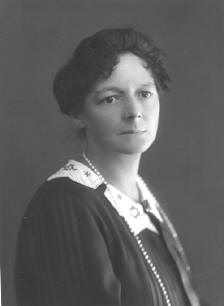 |
Born: Mansfield, c1874, died: 1956 (I.L.P. & Labour Party)
Miss Mary J. Bell started work, half-time, at the age of 10. She worked in the boot and shoe trade as a shoe fitter and joined NUBSO in 1892. In c1903, she was nominated by the Trades Council as a candidate for the Board of Guardians and was duly elected. Though she was not the first woman on the Board of Guardians, she was the first Labour woman and the first working woman to be elected to the local board.
Mary Bell spent 12 years as an elected member of the Board of Guardians during which time she claimed to have visited every case of childbirth in Wyggeston ward that came under the Poor Law authorities. She successfully moved the abolition of Oakhum picking and was also successful in her support for the appointment of a woman relieving officer. She argued that half the relieving officers in the country should be women. She was proud of the fact that in Leicester all women applicants came before a committee of 'lady' members, and were never questioned by the male members of the Board. In 1906, she was a member the national executive of the Labour League of Women and active in the Citizen’s Aid Society. She was also a member of the Distress Committee for nine years.
In 1911, when the Leicester Women’s Branch of NUBSO (No 3 branch) split from the union and became independent, she stayed in NUBSO and took over the secretaryship (and several other posts) of the branch when its membership stood at 58. As a result of her heroic efforts, membership slowly rose and even some of those who had defected to the independent union returned. However her increased union work led to her resignation from the Guardians in 1913. When she married Freddy Richards in 1916 she added his name to hers, becoming Mrs Bell-Richards (though he did not do the same.) That year, she became the full-time president of the branch and in 1918, she became the second woman to sit on the Executive Council of NUBSO. As the number of women in the industry increased, so did union membership. By 1939, when she retired, the membership of the branch stood at 6,136.
Mrs Mary Bell-Richards was a delegate to the International Working Women's Conference held in Geneva in 1921. It was held under the auspices of the Standing Joint Committee of Industrial Women's Organisations (to whose General Purpose Committee she was elected in 1925)
Like Lizzie Wilson, Mrs Bell-Richards was frequently at loggerheads with the rest of the executive over the role of the Women’s branch and the position of women in the union and in the workplace. In 1922, Mrs Bell Richards became convinced that that the Leicester Women’s Branch, if permitted to make their own terms with the employers, could exempt themselves from negotiated wage cuts. She was probably right, since the Independent Women’s Union was doing just that. However the union leadership refused to agree so Mrs Bell Richards resigned her seat on the EC and threatened secession by the Leicester Women’s branch.
“We want to be equal members of the Union and I want to say quite frankly that we shall fight this to the bitter end…..even to our extinction.”
The strong bargaining position of women in Leicester and the pugnacity of Mrs Bell-Richards ensured that women’s increased wages from 56% of the men’s rate to 67% in 1935. She managed to get the union to support the idea of an equal minimum wage for women in 1926, though many in the union saw it as a distant objective. She also wanted all factory departments to be open to women provided that the full men’s rate was paid. This was voted down by the Union conference in 1930 who did not want women engaged on work hitherto done by men.
Mary Jane, as she was called, believed that married women should go out to work arguing that working women had more independence and self respect than those that stayed at home. She fiercely resisted the notion that working women were not good mothers. In 1930 she told the Leicester Chronicle:
Very few men really believe in the equality of the sexes. They don't mind a woman drawing a wage for cleaning or domestic service, both of which are really hard work. It's when she enters the realms which they have hitherto mistakenly regarded as their own that the men suddenly remember that a woman's place is in the home. Personally, I cannot see why the men should not do some of the hard work, too - the charing and the domestic work. I do not separate men and women into different compartments in my own mind; they are both equal, and what is good for one is good for the other A married woman who goes out to help earn the living, is surely living up to the standard of real equality with the man ...... I am not suggesting that a woman should go out to work after she marries, but that she should have absolute freedom to do so if she wishes to.
In 1929, she was elected to be chair of the Leicester Trade Board. She had joined the Labour Party at its foundation and contested West Humberstone ward in 1924 and Charnwood ward in 1928 in local council elections.
Sources: Leicester Pioneer 27th March 1908, Leicester Chronicle 11th October 1930, Leicester Evening Mail 4th July 1956, Labour Leader 24th May 1907, Alan Fox, A History of the National Union of Boot and Shoe Workers, 1958, Richards, T.F. & Poulton E.L., Fifty Years: Being The History Of The National Union Of Boot And Shoe Operatives, Co-operative Magazine, Leicester Pioneer
|
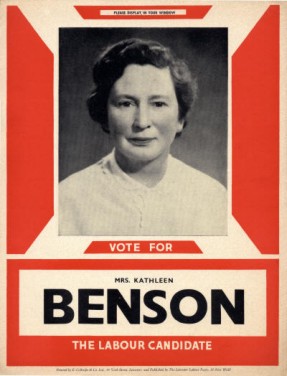 |
Born: London died 2008 aged 97 (Labour Party)
Kathleen Benson came to Leicester in 1945 having previously worked in the estates and housing department of the L.C.C. She was elected for to the City Council for North Braunstone in 1958 after having fought six unsuccessful contests in other wards. In 1965, she became ‘chairman’ of the city Health Committee. She lost her seat in the Conservative landslide of 1967 and became a social worker at Groby Road hospital.
Her husband, Chris Benson (d 1985) was a long serving City architect who was responsible for the design of much council housing from the 1925-65.
Sources: author’s personal knowledge
|
|
John Bent
Born: c1824 died 23rd July 1899 (Chartist)
John Bent ran a stationers, bookshop and bookbinding business in Rown Hall Lane Leicester. In the 1850s, he was very active in trying to revive the Chartist movement in Leicester.
born c 1824 died 23rd July 1899 became secretary of the Chartists in XXX. In 1882, you could contribute towards Charles Bradlaugh's election expenses at his bookstore where his family workedSources: author’s personal knowledge
|
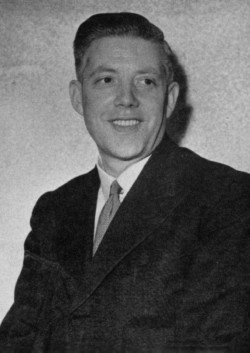 |
Born: Leicester 26th May 1914, died February 2002 aged 87, (Labour Party)
Arch Berridge left school in 1928 aged 14 and worked as an apprentice engineer at the firm of Ashwell and Nesbitt. He stayed with them as a centre lathe turner until 1938. After a spell as an insurance agent, he returned to the engineering industry in 1940, working for Goodwin and Barsby as an engineer. He joined the A.E.U. in 1942 and in 1943, became convenor, a post he held until he retired in 1979. He was elected secretary of his union branch in 1952 and served as a member of the District Committee of his union from 1950 to 1979.
In 1945, he joined the Labour Party in 1945. Arch Berridge first stood for the council in Aylestone ward 1961 and in 1962 was elected for Belgrave. Following his defeat in 1965, he returned to the City Council in September 1970 when he won Latimer Ward. In 1979 he was re-elected for the Belgrave Ward. He became a County Councillor in 1973 when he was elected to represent the Belgrave Ward on the new Leicestershire County Council. These ‘dual councillors’ attracted some criticism at the time because of a perceived conflict of loyalties. He became Lord Mayor in 1981.
A devout Methodist, he served in a number of offices in his local church at Claremont Street, Leicester over many years.
Sources: Leicester City Council, Roll of Lord Mayors 1928-2000
|
|
Born: c1866 Plymouth, Devon (I.L.P.)
George Bibbings was the full-time lecturer at the Spiritualist Hall in Silver Street. The hall was frequently used by the Socialist League and the S.D.F. for their meetings. He was elected to the Guardians for Newton ward in 1904, and believed in relief without pauperisation, advocating a more humane regime in the workhouse with increased payments for those on out-relief. He assisted George White in organising the unemployed in 1905. In 1906, he wrote two articles for the Leicester Daily Post which here highly critical of the Leicester workhouse. The workhouse as a "living hell” and he stated that its condition, through overcrowding, was equal to anything in Sodom and Gomorrah. In 1906, amid much publicity, he was fined £5 for assaulting his wife and disappeared from public life.
Sources: Bill Lancaster, Radicalism Co-operation and Socialism, Leicester Daily Post, 2nd January & 1st February 1906
|
_small.jpg) |
Born 1801, died 4th June 1871 (Liberal)
John Biggs was a radical politician, hosiery manufacturer and philanthropist who attended the Unitarian Great Meeting in Bond Street. Like his younger brother William he was self-made man and both brothers became prominent in the reform movement. In 1830, John Biggs founded the Leicester Political Union (later the Reform Society) which provided support for the 1831 Reform Bill and provided the political opposition to the Tory corporation. When municipal reform and elections finally took place in 1835, the old corrupt Tory corporation was swept from power. John and William Biggs were elected to the council and become leading lights in the new administration that took office in January 1836. John Biggs served as Mayor on three occasions: 1840, 1847, and 1855.
By the mid 1830s, a political gulf had opened between the working class and middle class wings of the reform movement. The Biggs's were adherents of political economy and had little sympathy for working class grievances over frame rents, wages and the poor law. The sweeping reforms advocated by the Chartists went far beyond what manufacturers and radicals like the Biggs's were prepared to contemplate.
John Biggs had a good reputation as an employer. After the slump of 1838, his was the first factory in Leicester to raise wages. However, whilst the Biggs's were Radical in politics, they regarded unions as wrong-headed. They saw that the route to improvement lay with free trade. In consequence, John Biggs founded the Leicester Anti-Corn Law League in 1838 whose aim was to achieve freer imports and exports and which would then bring down the price of bread. Some Chartists saw the Anti-Corn Law League as something of a diversion, whilst others gave their support.
In 1840, Biggs advocated household suffrage arguing that possession of property indicated "talent and moral qualities" which furnished sufficient leisure for "moral and mental improvement." By 1842, Biggs' Midland Counties Charter advocated 'universal' suffrage for men over 25 and triennial parliaments. But the Chartist stood firm for their six points and any common ground with the working class was hampered by a bitter strike broke out amongst the glove-hands in 1843. The Chartists were able to point accusingly at Liberal politicians and hosiery employers like Biggs brothers who, despite their radical credentials, were opposed to the removal of frame rents and were resistant to calls for decent wages. Nevertheless, Biggs did use his influence to curb the worst instances of repression against the Chartists by the magistrates.
By the late 1840s, John Biggs believed it was necessary to channel working-class dissent of the Chartists into the Liberal party. By 1847, the Biggs's had adopted manhood suffrage and church disestablishmentarianism as their programme. As the power of the chartist movement declined, an alliance between classes became possible. As Mayor, John Biggs presided over the Great Reform meeting of April 1848 which reunited the Chartist with middle class radicals.
The Chartist leader John Markham, was among those who stood for election in 1852 as a nominee of the Reform Society. They stood on a programme of votes by ballot, the redistribution of seats, triennial parliaments, the removal of taxes on raw material, the substitution of direct for indirect taxation, a national system of secular education and electoral rights bases on the payment of taxes and residence. This had much in common with the six points of the Charter. This alliance was opposed by dissident Whigs and their paper the Leicester Chronicle who branded Biggs as a ‘Red Republican’ and ‘Chartist.’ Throughout the 1850s, parliamentary contests were a three way fight between the Radicals, Whigs and Tories.
Sir Henry Halford was the Conservative member for South Leicestershire and in 1853, he introduced a bill to abolish frame rents. Although the bill failed, it led to John Biggs dramatically announcing his own 'Discontinuance of Frame Rents without Act of Parliament'. In 1855, he had 4,000 frames and was at the time Leicester's largest hosier. Corah soon overtook Biggs, but it was not until 1866 before Corah also abolished the hated frame rents.
Biggs was elected to parliament in June 1856, in a bye-election caused by the death of the radical Richard Gardner. The fact that his firm had voluntarily abolished frame rents garnered him working class support led by George Buckby who advised his followers to vote radical. However, he became Leicester's sole radical in parliament when in 1857 Walmsley lost his seat as the dissenters voted Tory in protest against his support for opening London museums on Sunday. He entertained the exiled Hungarian leader Louis Kossuth who conducted a meeting in Knighton Park Road underneath an Elm tree which was part of an avenue of elms. It became known as the Kossuth tree - even after it was felled c1929.
On the collapse of his hosiery business in 1862, John Biggs stepped down from parliament and was replaced by another radical, P.A. Taylor. John Biggs' memory is honoured in Leicester with a statue in Welford Place. (The present bronze dates from 1929 and is modelled on the original marble statue which could not be repaired) He is buried in Welford Road Cemetery.
Sources: Leicester Chronicle, 5th June and 7th July 1852, Midlands Free Press 10th June 1871, Leicester Evening Mail 24th January 1929, 30th December 1948, A. Temple Patterson, Radical Leicester, Bill Lancaster, Radicalism Co-operation and Socialism, VCH Vol 4, R.H. Evans, The Biggs Family of Leicester, LAHS 1972-73
|
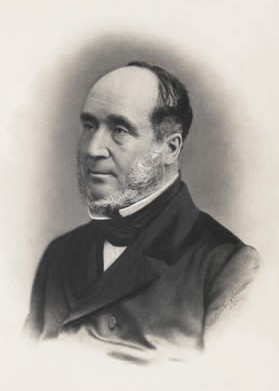 |
Born 1805, died 1881 (Liberal)
Having advocated ‘almost universal’ suffrage in 1830, William Biggs leapt into the front ranks of the reform party, becoming secretary of the Political Union and its successor, the Reform Society. When municipal reform and elections finally took place in 1835, the old corrupt Tory corporation was swept from office. William was elected to he council and was also secretary of the local Liberal Association and led his party in gaining the town's two seats from the Tories in 1838. By this time William Biggs had retreated from his earlier views on universal suffrage and become closer to the Whig wing of Liberalism which was very cautious of electoral reform.
In 1841 Biggs proposed a Midlands County Charter to bridge the gap between the middle-class reformers and the Chartists. Temple Patterson makes the point that his proposals came close to plagiarism of Joseph Sturge's Complete Suffrage proposals, though Biggs considered Sturge's advocacy of "complete" suffrage as going too far. Bigg's charter had a lukewarm reception and the Mercury advised him and leave the field to the Complete Suffrage Association.
William, a hosiery manufacturer, was also less sympathetic to working class grievances than his brother John. During the glove hands strike of 1843, the strikers’ band played the dead march in front of his warehouse. Several hundred men were seen in procession headed by a very large placard having up on it: ‘More aggressions of the glove manufacturers to crush the working man.’ This was followed by a black banner having painted on it a white slave, with his clothes all tattered and cut into rags and apparently in a dying state. It was inscribed: ‘The white slave or dying operative, our rights or nothing else.” The march went to different manufacturers asking for the same rate of pay from a year previously. Nine manufacturers agreed to give the price. “However William Biggs the concoctor of the Midland Counties Charter, the great reformer of the House of Lords, the supposed philanthropist and great teacher of equality said he would not talk to the men.”
William Biggs parted from his brother on the issue of frame rents, whereby framework knitter s paid his master a rent for the frame upon which he worked. William used his maiden speech in the House of Commons, seemingly oblivious to any conflict of interest, to attack a bill introduced to abolish frame-rents.
He was mayor in 1842, 1848 and 1859. In 1852 he was elected MP for Newport, Isle of Wight, a seat he held until 1857. In 1849, he supported the establishment of a compulsory national secular system of education under local control. and later became strong opponent of England’s involvement in the Crimean War. He wrote a pamphlet entitled Never Go To War For Turkey. During the 1850s, he was in the radical wing of the Liberal Party and a supporter of manhood suffrage and household suffrage, the (secret) ballot and the redistribution of parliamentary seats. He frequently chaired meetings on the issue of parliamentary reform. He also opposed the game laws and that of primogeniture.
During the American Civil War he often spoke out in support of the Union. He advocated the establishment of the Welford Road Cemetery. He also went into the family business in the course of which he travelled extensively in Europe and the USA.
Sources: Northern Star, 24th June 1843, Leicester Chronicle, 14th April 1849, 19th Febraury 1859, A. Temple Patterson, Radical Leicester, R.H. Evans, The Biggs Family of Leicester, LAHS 1972-73
|
 |
Born: Leicester, 12th May 1924, died: July 1997 aged 73 (Labour Party)
George Billington left school at 16 and, apart from war service, worked most of his life as a clerk. He joined the Labour Party in 1949 and became secretary of the Newton Ward branch in the 1950s and the Secretary of the newly-formed New Parks branch in 1982. In 1969, he became Barnet Janner’s election agent and continued in that capacity for his son, Greville.
George Billington was elected to the City Council in 1971 for the Newton Ward and as a County Councillor in 1973, holding minor positions of responsibility on both councils. He was regarded as being on the right of the party and during the 1970s and 1980s, he was a staunch opponent of Militant supporters within the Labour Party. For many years, he was the butt of Colin Grundy’s jokes, which he always took in good part. He became Lord Mayor in 1983 and stood down in 1996.
Sources: Leicester City Council, Roll of Lord Mayors 1928-2000, author’s personal knowledge
|
|
Charles Billson
Born: Leicester 8th November 1804, died 15th April 1878 aged 73 (Liberal)
Charles Billson was a hosier (stocking manufacturer) who lived on Friars Lane and later New Walk. He was a member of the Complete Suffrage Association and in 1842 was re-elected to the Town Council from East St Mary's Ward unopposed. He was one of the Biggsite Radicals and a member of the British Anti-State Church Association. (A disestablishmentarian)
He held the patent for the Wickea's Patent Stocking Frame and Warp Loom for which he sold licences. He had a factory. The inherent injustices in the hosiery trade made it very difficult for the radical middle classes to work alongside the working class Chartists. In 1846, his speech in support of the candidature of the radical George Thompson was rudely interrupted.
When he stepped forward with a resolution his hand, with the intention of reading it. The assembly became one mass of confusion and outcry. George Buckby the Chartist leader asked "are you the Billson that docked the sock hands?" The press reported that:
Stentorian lungs bellowing forth, "Old Dock-sock." "Puppy Billson," "Who docked their men 4d. a dozen," "Warming-pan," "Go home, Charley," " Long hours and short wages," "Turn him out," and scores of other epithets from more feeble voices. A man in the body of the hall got up, and said he wished some explanation to be given about docking the sock-hands before the resolution was put. For some time this continued, and the speaker, with the utmost sang froid, and impudent manner, placed himself on the front the platform, with a seeming determination to tax the patience of the assembly. Several times attempted to read his lesson, but each effort only drew forth additional confusion; at last he jabbered it over, his "musical" voice not being heard by any one hut himself, and then sneaked to his seat.
During the 1850s, he remained in support of the extension of the franchise and the antagonism with the former Chartists had subsided. He gave his support to Sir Joshua Walmsley at a time when Mursell's sabbartarians had deserted to the Whigs. The Whigs stood against him in 1857, on the issue of Sunday music and the opening of museums. At the time he was the chairman of the Public Music Committee which supported music on the racecourse, though not on Sundays. It gave 27 performances in 1856. He was a member of the Biggs supporting Liberal Electors Committee and presented Walmsley with the Ladies' Flag at the huge demonstration in Walmsley's honour following his defeat in the election of 1857.
Sources: Leicestershire Mercury, 11th February 1843, Leicester Chronicle, 28th February 1846, Leicester Journal - Friday 16th & 31st October 1857
|
|
Born circa 1859 (Socialist League and Fabian Society)
James Billson was a member of the Secular Society and a friend of the Gimson family. James Billson’s father Jon was a coal merchant and James worked in the trade as well as being a florist and a farmer. He was a Kyrle Society subscriber and friend of G.B. Shaw. He gave financial support to the Socialist League and chaired its meetings in the 1880s and 1890s and was a friend of J.W. Barrs. In the 1890s he joined the Fabian Society and bought an estate which included the ruins of the medieval priory of Ulverscroft. He sold two plots to Sydney and Mentor Gimson and commissioned Ernest Gimson to build a two cottages on his piece of land. Ernest then built ‘Stoneywell’ cottage (1898) for Sydney, ‘Lea’ cottage for Mentor and ‘Rockyfield’ cottage for Margaret Gimson (1908). It was this way that Billson and the Gimsons fulfilled their version of William Morris’ rural utopia in houses built according to the precepts of the Arts & Crafts movement.
Sources: David Nash, Secularism, Art and Freedom, Leicester Arts and Museums Service, Ernest Gimson & the Arts & Crafts Movement in Leicester, census returns
|
|
Born: c1810 Leicester Died Nottingham 1883? (Universal Community Society of Rational Religionists, Rational Society, Leicester Secular Society)
John Billson was a schoolmaster who during the 1840s ran an academy in Highcross Street. In 1837, he had been among those summoned for refusal to pay church-rates, one of whom, William Baines, went to prison. Billson became an active supporter of Robert Owen and was one of the leading figures in the Leicester branch of Robert Owen’s Universal Community Society of Rational Religionists, later the Rational Society. He is recorded as giving lectures to the Owenites in 1838. His name appears from Owen's New Moral World and and later in editions of Holyoak's Reasoner published from the mid 1840s.. (T or J.H. Billson was also a member of the branch in 1839).
In 1842, he participated in a very long debate with Thomas Cooper's chartists as to whether Home Colonisation and the abolition of classes in society or the the Charter provided a solution to the people's distress. There were 1,500 people present.
He was also the auditor of the Mechanics Institute (1844). In 1852, Billson was a committee a founder member of the Leicester Secular Society and was also active in discussion class at the Domestic Mission in the 1850s. In the 1850's, he sold sheet music and he ran a news agents, with a circulating library of 2,500 volumes, a school and a stationers business at 13 Belgrave Gate. He got into financial difficulties in 1857, fled to Aberystwyth and was subsequently made bankrupt. In 1861, he was living in Nottingham and working as a paper bag manufacturer.
Sources: Leicester Chronicle 25th November 1837, 7th November 1840, New Moral World 21st July 1838, Leicestershire Mercury, 29 September 1855, 16th January 1858, County Courts Chronicle, 9th July 1842, 1st January 1859, New Moral World, 24th August 1839, Census returns
|
|
Born: circa 1826, died 1881 (Hose, Shirt & Drawer Hosiery Union)
In 1858, two unions for framework knitters were formed in Leicester: the Sock and Top Union and the Hose, Shirt and Drawer Hosiery Union. Robert Bindley was a leading figure in latter and in 1872, the two unions merged to form the Leicestershire Framework Knitters Union. Members of the Hose, Shirt and Drawer Union benefited from the Victorian fad for woollen underwear. Although, like the glove trade, it could suffer from the vagaries of fashion, by 1870 the union’s membership had grown to 1,000 members in Leicester and 1,000 in the County.
When Robert Bindley gave evidence to the Commission into the Truck System, in 1871, he had been a framework knitter for 34 years. It had long been the practice for middlemen to rent out knitting frames to stockingers. Along with Daniel Merrick, in the Sock and Top Union, he was active in the successful campaign for legislation to abolish frame rents and charges. Bindley describes how the spreading of work amongst as many frames as possible, even during depressed times, ensured that the hosiers or middlemen received their profit at the same time as it perpetuated the framework knitters poverty. He believed that the surplus of frames was not an accident, but had been deliberately devised by masters, since the rents and charges were the most lucrative part of the business.
In his pamphlet on the struggle against frame charges (1875), he described how difficult it was to find men who would give evidence against the system even though they had been ‘cruelly oppressed.’ “This fearful feeling was not confined to the men, some of the leaders acted with the same timidness.” He described how for thirty years all those who had campaigned against these rents had been victimised in some way or other. Bindley supported co-operative production and his union purchased the ailing Hosiery Co-op in 1875, purchasing 7 frames with union funds.
Sources: R. Bindley, The History of the Struggle for the Abolition of Frame Rents & Charges, 1875
|
|
Died: January 1935 (Communist Party)
Jack Binns was an Irishman and unemployed engineer who came to Leicester in 1920 in search of work. He soon became Chairman of the unemployed committee with John Minto as secretary. In early 1921, he was moving resolutions at meetings of the unemployed in the Market Place which demanded the reopening of trade with Russia, the institution of maintenance of £2 per week for unemployed householders, 25/- for every single man and woman and 4/- for each dependent child.
His political views were not liked by prospective employers and he had difficulty finding a job. At one time, he had to work as a peddler to eke out a living. ‘Little’ Redfern remembered him as a very straightforward man who was a capable speaker and a good worker for the Communist Party. He was active in the National Unemployed Workers' Movement up to his death in 1935. He was a delegate to the Trades Council from the A.E.U. and a member of the executive of the Trades Council in 1928.
Sources: Leicester Mercury 11th January 1935
|
|
Died: February 1991 aged 93
Susan Bird was appointed to of full time organiser of the Leicester Hosiery Union in 1934. This appointment by the executive was bitterly resented by some sections of the male membership. In 1947, she became Nottingham district secretary for the NUHK and she travelled to her job from Leicester until she retired in 1962. She was elected to the City Council in 1951, representing Humberstone ward until 1954.
Sources: Leicester Mercury, 13th June 1962, 7th February 1991
|
|
|
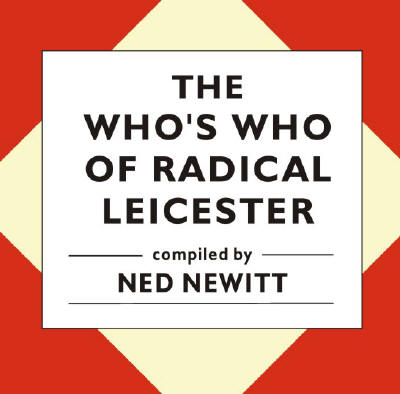 |
Back to Top |
|
© Ned Newitt Last revised: September 13, 2024.
|
|
|
Bl-Bz
Leicester's
Radical History
These are pages of articles on different topics.
Contact
|
